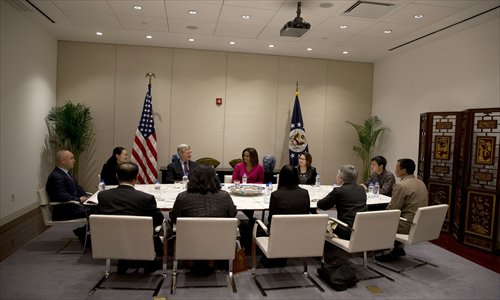HOME >> CHINA
US embassy reaches out to Chinese online
By Liu Xin Source:Global Times Published: 2016-5-8 20:08:01

US first lady Michelle Obama (center) and US Ambassador to China Max Baucus (center left) attend a roundtable discussion on education at the US Embassy in Beijing in March 2014. Photo: IC
The US Embassy in Beijing and popular Chinese question-and-answer website zhihu.com jointly started an online discussion in late April, raising concerns among some about whether the embassy was pushing US ideology via cultural exchange.
"Discover the US" was hosted by the US Embassy and featured eight guests answering questions, including four US diplomats, a professor of political science and environmental law, a Fulbright scholar at Nankai University, a political blogger and a theatre worker.
"It is hard for a man to say he is totally immune to the influence from the other side of the Pacific Ocean even though he has never stepped into the US. The diversified culture and unique style of its cities have attracted people from all walks of life," read the introduction posted on zhihu.com.
Zhihu organized this activity, which has since been viewed over 1 million times, since topics on the US - especially related to visas and education - are always popular on Zhihu, Wang Bohan, an employee who was responsible for running the roundtable, told the Global Times.
There are 43 questions listed on the activity's webpage, ranging from "how to get cheap Broadway tickets" to "what jobs do counsels or members from the election campaign do after the end of the presidential election." More than 10 questions are about visa rules.
The four diplomats participated in discussions and gave 26 answers to netizens' questions.
The query "how to evaluate the abrupt appearance of a group of US diplomats on Zhihu" was posted on the website soon after the event.
An anonymous user wrote that diplomats gave positive introductions of US society when answering questions and their adept communication skills helped export US values and culture.
People-to-people
Yin Yungong, an expert on the socialist system at the Chinese Academy of Social Sciences, told the Global Times that this event was "ideological publicity" in the name of cultural exchange and the US is using social media in China to enlarge its influence, especially among young people.
Benjamin Weber, the spokesperson from the US Embassy, told the Global Times that "as part of its role as the representative of the people of the United States to the people of China for cultural and people-to-people diplomacy, the embassy employs its own social media platforms and participates in a range of media activities at the invitation of Chinese organizations and media."
He also said that the embassy's public diplomacy is meant both to explain the US in all its diversity to Chinese audiences and also to foster vibrant and open discussions involving a wide range of few points about issues of interests to the American and the Chinese people.
Zhihu wanted to invite some qualified guests - visa officers and diplomats from the US Embassy - to give professional answers to questions on the US, including its visa rules, education, culture and traveling in the country, said Wang.
Wang added that the activity comes on heels of the "2016 China-US Tourism Year" launched in March and a recent US government announcement of new visa rules.
"Talich," a zhihu.com user who was invited by Zhihu to join the discussion, told the Global Times that if the Chinese Embassy in the US was invited by quora.com, a US website similar to zhihu.com, it would take the opportunity to garner "publicity in a same way" and it is the US diplomats' job to deliver messages and burnish the nation's image.
Aside from starting an official account on Sina Weibo, the US Embassy also runs a public WeChat account and releases notices about embassy activities via douban.com.
It is not surprising that the US Embassy runs so many social media accounts since it has more resources and influence than other nation's embassies and China has an important place in US foreign policy, a press officer from a European embassy in China, who asked for anonymity, told the Global Times.
The US Embassy runs more than 60 accounts on social media in China, Nandu Weekly reported.
The press officer said that running accounts on social media in China helps embassies have more interactions with Chinese people, but some of their posts may face a backlash from netizens if they think they are offensive.
"Some of our posts may be blocked by social media over 'sensitive' words, even if the content itself has nothing to do with sensitive news. For example, Sina Weibo blocked one of our posts because it contained the word zhou when it was announced that Zhou Yongkang, a corrupt official, was being arrested," said the press officer.
Newspaper headline: Digital diplomacy
Posted in: Society